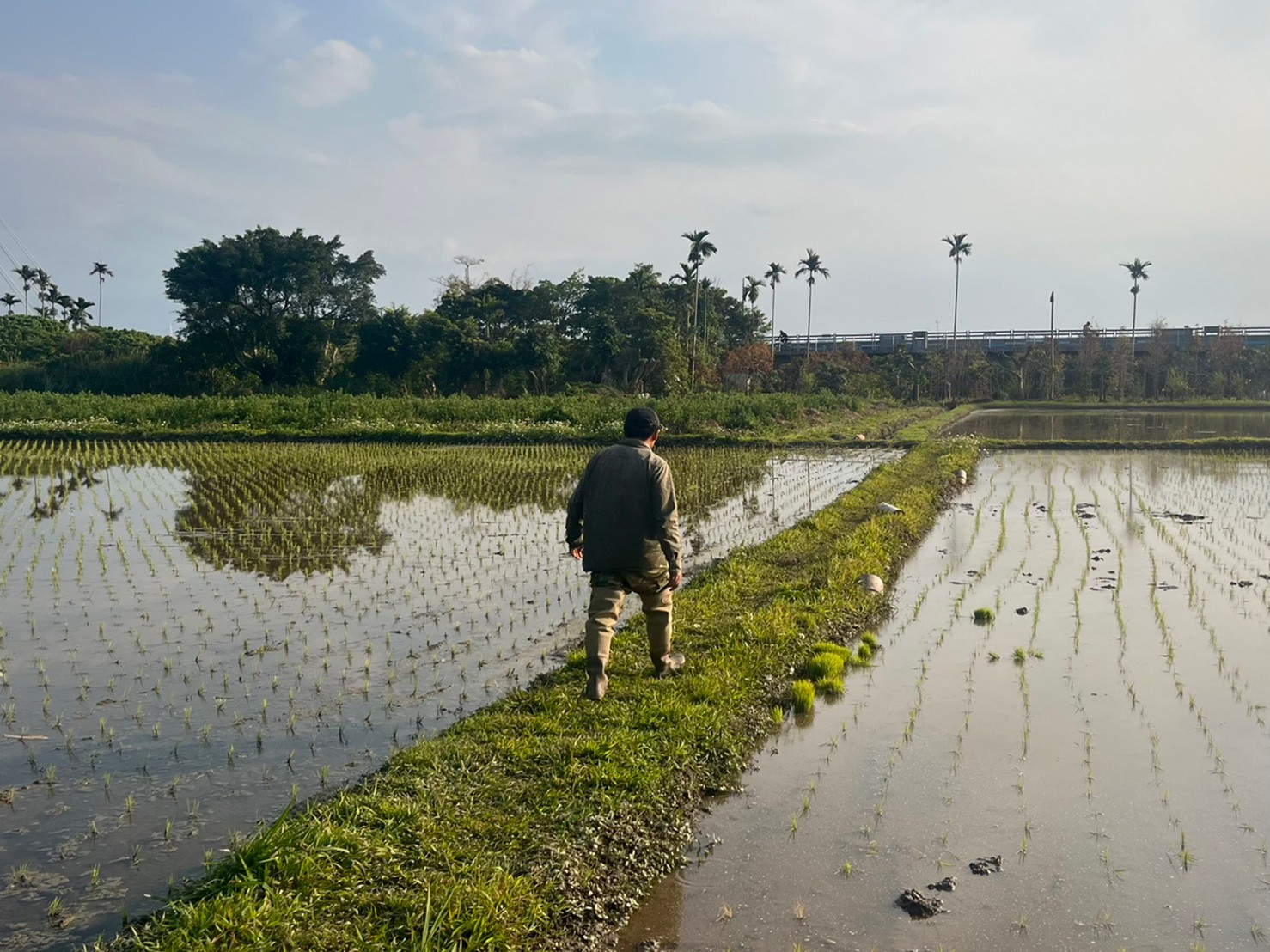Reporters/HUANG, LI-LIEN SHAVELA VALENSKA
Believe it or not, Taipei, the capital city of Taiwan was once an area where people commuted by boats across the lands packed with rice fields. Many historians have traced evidence of rice farming in the area back to as far as 5000 BC. According to the Ministry of Economic Affairs, R.O.C, farming has long been the backbone of the economy in Taiwan. Back then, Taipei was known as one of Taiwan’s major rice producers. Today, however, there is only one remaining rice farm in the city.
Remaining Pure Land in Metropolis
Located in the north of Taipei, Eight Immortals and Six Generations Garden(八仙六代園) owned by Wang, Xuan-zhi (王宣智) has survived six generations. Wang explained that agriculture used to be an essential part of Taipei’s culture, but urbanization has made people forget this connection, leading to a decrease in demand for rice farming as an occupation.
Wang, Xuan-zhi grew up by the ocean in Keelung, northeastern Taiwan, and had never seen a rice farm until he took over his father-in-law’s farm. His desire for a slow-paced lifestyle and more family time led him to take the challenge to create “a sense of paradise in the midst of the city.”
Throughout his eight years of being a farmer, Wang found that there are many amenities of living near the city. He explained about how being close to his consumers has helped his business in different ways, mainly in efficiently transporting the goods. The location of his rice farm has also allowed many children from the city to have the opportunity to enjoy a day trip, immersing in a rice farming experience without having to exhaustively travel outside Taipei City.
On the other hand, Wang, Xuan-zhi indicated that since most of the city resources are utilized in the business and service industries instead of the agriculture industry, Taipei is no longer an agricultural district. Thus, farming in Taipei has its challenges, such as the city’s complicated land regulations. The land Wang used for his seven rice fields was once agricultural land, but it is now designated as a reserved area for public facilities. Worrying that his farmland will be expropriated by the government at any time, Wang has no sense of security. Moreover, the public’s lack of knowledge about rice being grown in Taipei threatens the credibility of Wang’s brand. Some customers even question and doubt the authenticity of his product. “Once I tried to sell 50-60 bags of rice and after two days, I returned with 50-60 bags. It was such a brutal reality,” Wang sighed.

Organic vs Conventional Rice Farming
While undergoing the trials and tribulations of rice farming, Wang, Xuan-zhi has observed the society’s growing trend toward health consciousness. Therefore, he took the opportunity to dedicate one of his seven fields to organic rice farming. Initially, there was resistance from his father-in-law, but Wang persisted and the change proved to be a turning point for the farm. Wang explained that through conventional farming alone, Eight Immortals and Six Generations Garden is unable to compete with larger farms in southern Taiwan. However, as the price of organic rice is higher than non-organic rice, organic farming method has allowed Wang to make greater profit with the same amount of rice planted in one field.
Although Wang, Xuan-zhi is gaining profit from organic farming methods, it has never been a simple task. Organic farming methods and conventional farming methods both entail similar procedures: transplanting seedling, fertilizing, weeding and harvesting. According to the Food and Agriculture Organizations of the United Nations, the only difference between the two methods is that organic farming uses no synthetic fertilizer or pesticides. It creates a healthier ecosystem, resulting in rice that is more nutrient-dense. Wang claimed that organic rice tastes better than conventional rice, as it has a unique nutty, buttery and a slight sweet taste with a chewy texture. Moreover, organic farming methods produce more aesthetically pleasing greener rice paddies, as the use of pesticide and synthetic fertilizer would often cause the rice paddies to turn yellowish. On the other hand, one of the prime functions of pesticides and synthetic fertilizer is weed control. Rice weeds tend to grow tall and dense, blocking out sunlight from reaching the rice. Thus, a continuous and laborious process of weeding is required to maintain a healthy organic rice field. When asked if the use of machines helps in making this weeding process easier, Wang replied that although machines help reduce labor, they are not perfect and are still unable to fully replace manpower. Although organic farming has its challenges, Wang hoped that he had the manpower to implement this method in his other six rice fields.

Wang, Xuan-zhi defended conventional farming methods by saying, “The use of pesticides is not a crime.” Pesticides were first introduced during the green revolution to increase food production in order to meet the demand of the society. The safety of pesticides depends on the level of exposure. Wang compared pesticides to medicine by saying that when people feel ill, they usually opt to consume medicine made of chemicals, but in fact it will only be harmful if the medicine is consumed in large quantities. Wang acknowledged that the problem with pesticides lies in their method of usage. As a matter of fact, 99% of the farmers in Taiwan do not major in agriculture and Wang, a history graduate, is no exception. Therefore, learning from farmers of previous generations is the typical method wherein instructions for the use of pesticides are often according to the rule of thumb, resulting in the misuse of pesticides. Fortunately, with the rise of farmer associations which offer farming courses, farmers nowadays can implement safer ways of using pesticides. “Experience is important, so are new approaches to pesticide usage,” said Wang who travels to other cities to take organic farming method classes once a month.

Diversity of Rice Types and Tastes
Due to food shortage in the old days, Chinese often greet each other with the phrase “Have you eaten yet?” (Mandarin: 吃飯了嗎?,Cantonese: 食咗飯未呀?), which is equivalent to “how are you” in Western culture. Filipinos, Koreans, and Indian people would also use this phrase as a way of showing concern for someone’s well-being. Food plays a vital role in many cultures, and rice is a staple food for most Asians who, according to the United Nations, account for up to half of the population of the world. Wang explained that the varieties of rice are actually diverse, with each country or even region having great differences in the types and preference of rice grown. For example, Southeast Asian countries such as India and Thailand favor long rice with a dry and hard texture, commonly cooked into dishes such as fried rice. On the contrary, Japanese and Taiwanese prefer round and short rice with a sweet taste and a chewy texture, making it suitable for dishes such as sushi.
Wang, Xuan-zhi further explained how the development of Taiwan’s agricultural technology and Agricultural Research and Extension Stations set up by the government in all regions of Taiwan have helped in improving the production of rice. Agricultural Research and Extension Stations not only assist farmers in learning new farming skills, sustainable practices, and marketing of rice products, they also conduct extensive research on generating different types of rice based on local climate and local people’s preferences. For instance, Taiwan’s rice brand Taoyuan 3, Taichung 197, Tainan 11 and Kaohsiung 147 are all improved products of rice. Among them, Taoyuan No. 3 and Taichung No. 197 are fragrant rice, characterized by their distinctive aroma, with the aroma of Taoyuan No. 3 being taro, while Taichung 197 has the aroma of pandan leaf.

Education and Awareness through Fun Farming Experiences
In addition to organic rice cultivation, holding farming experience activities is a new approach adopted by Eight Immortals and Six Generations Garden. It combines agriculture with leisure and entertainment, allowing visitors to learn about agriculture through actual participation. This rice farm specially designed agricultural production activities in different seasons. Experiential activities include seedling transplanting experience from February to March, sickle harvesting from June to July, rosella hibiscus picking in November, radish pulling activities from December to January, and strawberry picking in February. Moreover, jam making, DIY grass scarecrow, rice cake carving, making rice crackers, and on-site cooking are but some of the activities that the rice farm has offered. In these activities, Wang’s wife, Zheng, Yi-zhen (鄭亦真) conducts guided tour and explanations, helping visitors to have a better understanding of agricultural tourism in different seasons.

Although Eight Immortals and Six Generations Garden’s main focus is on production, which helps Wang to survive in times of Covid-19 pandemic, he still hopes that through the activities they offer, Taipei children will have an opportunity to come into contact with the soil, learn and appreciate the laborious process of food production. These activities also increase people’s awareness of the existing rice farm in Taipei, which in turn help in the overall branding and product sales, as well as in supporting Wang to run the rice farm.
Hope for a Better Future for Rice Farming
Protection of land, environmental sustainability, and returning to nature are the tenets of Eight Immortals and Six Generations Garden. Wang, Xuan-zhi is taking it one step at a time to ensure the bright future of this rice farm. To date, he is pleased with all the strides that have been made, from implementing organic farming methods to conducting experiential activities. The next step he has in mind would be to take measures so as to make greater impacts for the farming industry, specifically to help people change their stereotypical negative impression on farming.

Many people in Taiwan see farming as a poor man’s occupation, with the impression that farmers rely heavily on government subsidies to survive. “People criticize farmers for receiving government subsidies, but rarely do they know why the government gives farmers these subsidies,” Wang, Xuan-zhi sighed. In reality, farmers are vital to a country’s well being, as importing food from other countries creates dependency, resulting in an increase of risk for the country’s welfare. Furthermore, subsidies from the government are used to help keep the price of commodities stable in the market, as excessive price fluctuations bring inconvenience and panic to the people in the society. Wang believed that subsidies and farming insurance from the government are compensation for the farmers’ strenuous physical labor and hard work in undertaking an occupation that is being undervalued in this modern age.
Notwithstanding people’s negative views on farmers, Wang, Xuan-zhi continues to take pleasure in his occupation. “Passion is what keeps me going,” Wang stressed. He further stated that he found a sense of accomplishment whenever consumers praise him for his product and take a liking to his produce.
Rice farming could be regarded as an endangered occupation in the cities. Wang’s Eight Immortals and Six Generations Gardens serves as a reminder of Taipei’s once thriving agricultural past. His dedication to organic farming demonstrates the potential benefits of adopting new methods, even in traditional industries. Hopefully, he will be able to pass on this business to his two offsprings.




